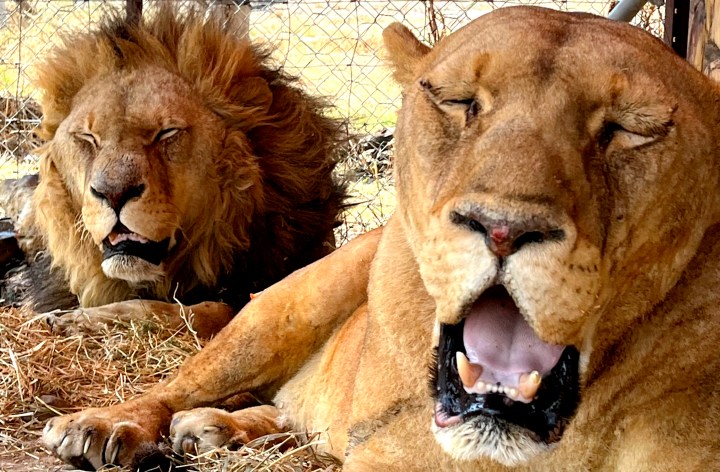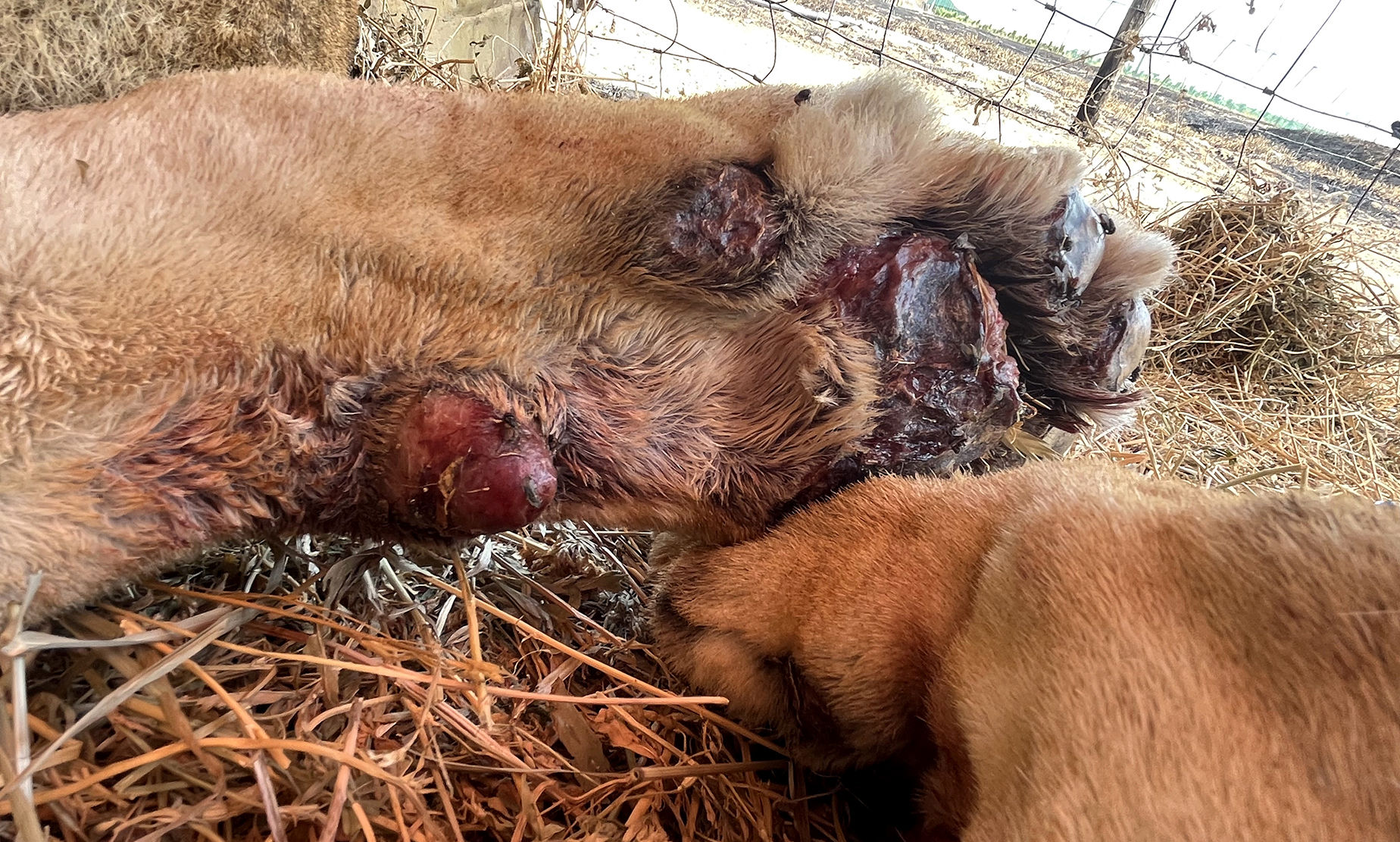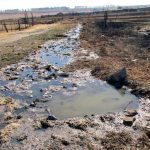ANIMAL ABUSE
Worcester nature reserve donation scratched after probe launched into burnt, ‘illegally kept’ lions

The South African Predator Association has halted its plan to donate three lions to the Fairy Glen Nature Reserve in Worcester after the reserve’s lions, which were reportedly kept illegally, had to be euthanised due to serious injuries from a wildfire and subsequent ‘questionable’ veterinary care.
In the aftermath of the Fairy Glen fire in Worcester, Western Cape, two weeks ago, the National Council of Societies for the Prevention of Cruelty to Animals (NSPCA) discovered that three lions had been “illegally kept” by the Fairy Glen Nature Reserve.
The NSPCA said the lions had to be euthanised after suffering severe burns and subsequently receiving “questionable” veterinary treatment.
It said Fairy Glen held no licence in terms of the Performing Animals Protection Act for the animals, “despite, in essence, operating as a zoo, with animals confined and exhibited for profit”.
The NSPCA is finalising its investigations into possible animal cruelty, which may result in charges being laid. An ongoing investigation is also being conducted by the provincial authority CapeNature.
Devastating state of the lions
The three lions — one male and two females — suffered severe burns to their paws, eyes, mouths and chests, which led to secondary infections.

Three lions from the Fairy Glen Nature Reserve sustained serious burns to their paws, eyes, mouths and chests, with secondary infections. The lions were left in confinement for six days after sustaining the burns and after due consideration, all three lions were humanely euthanised. (Photo: NSPCA)

The National Council of Societies for the Prevention of Cruelty to Animals (NSPCA) is currently finalising its investigations into possible animal cruelty, which may result in laying charges upon examination of their case. (Photo: NSPCA)

Despite Fairy Glen procuring veterinary treatment for the animals, the National Council of Societies for the Prevention of Cruelty to Animals said the treatment plan was highly questionable, with the lions left under conditions in which continued suffering was apparent. Treatment for the two lionesses was only initiated on Tuesday, 30 January 2024 – four days after the lions were burnt. All three lions were supposed to be in intensive care. (Photo: NSPCA)

A devastating sight was the male lion keeping his hind paw in a dirty water trough, in a desperate attempt to relieve his immense pain, while being unable to stand or move around. (Photo: NSPCA)

Upon investigation, the National Council of Societies for the Prevention of Cruelty to Animals, (NSPCA) found that the camps the lions were held in were too small, while provincial regulations require at least half a hectare per lion. The camps were soiled with rotting chicken carcasses, infested with maggots. (Photo: NSPCA)
Burn wounds were observed on the male lion’s tongue and all three were severely dehydrated. Treatment for the two lionesses only began on 30 January, four days after the lions were burnt in the fire.
After the fire, the NSPCA dispatched a team to the reserve, including a renowned big cat expert, Dr Peter Caldwell, to assess and assist the lions.
The NSPCA found that the veterinary treatment Fairy Glen procured for the lions was “highly questionable” as they should have gone straight into intensive care, but instead had been left to suffer.
NSPCA chief operations officer Grace de Lange said, “It was apparent that one female lion was too weak to stand up. The lions were left in confinement for six days after sustaining the burns, with the male having pressure sores from being immobile.”
De Lange said a particularly devastating sight was the male lion keeping his hind paw in a dirty water trough, in a desperate attempt to relieve his pain, while being unable to stand or move around.
The NSPCA euthanised all three lions to stop them from suffering further.
Aside from the severe burns, the NSPCA found that the camps for the animals were too small — provincial regulations require at least half a hectare per lion.
“The camps were soiled with rotting chicken carcasses, infested with maggots,” the NSPCA said.
It also found that the lions had been on display at Fairy Glen with no privacy or space to retreat, while the reserve did not have the requisite licence.
Daily Maverick called, emailed and messaged Fairy Glen Nature Reserve between Friday and lunch time on Tuesday, but had received no response at the time of publication.
Sapa’s lion donation
Following reports that the three lions had been euthanised, the South African Predator Association (Sapa) announced that it would donate three lions to the Fairy Glen Nature Reserve, which led to immediate criticism.
NSPCA spokesperson Jacques Peacock said, “The NSPCA is appalled by Sapa’s apparent ‘donation’, as it just emphasises how disposable these animals are — treated like commodities. However, we hope and trust that CapeNature will ensure the welfare of any animals possibly acquired by Fairy Glen during the permit process.”
Sapa’s president, Hannes Wessels, said the association faced criticism before it could even contact Fairy Glen.
He told Daily Maverick that the donation would not take place in light of the information that had been revealed in the media and by the public. However, he said that should all regulations and welfare issues be met and Fairy Glen’s camps meet Sapa’s norms and standards, they could reconsider the donation.
“Sapa offered to donate when we heard the news of the lions that had to be euthanised after the fire. The donation cannot happen if all welfare and regulations have not been met.
“Before we could even contact Fairy Glen, Sapa [was] attacked in the media. The decision was taken purely to assist the community in rebuilding what was lost in the fire. We had no knowledge of the circumstances surrounding the lions on Fairy Glen,” Wessels said.
He raised concerns about why the NSPCA’s issues were only brought to light now, when — according to reports received by Sapa — the situation had been ongoing for a decade.
Outcry from conservation bodies
Dr Neil D’Cruze, from World Animal Protection (WAP), and Dr Louise de Waal, from Blood Lions, told Daily Maverick it was “extremely concerning” to hear that the lions were the victims of animal cruelty and neglect.
Blood Lions and WAP have raised concerns and extensively researched the unregulated nature of the captive lion industry.
They stated, “This case of severe neglect and abuse in addition to the absence of all necessary permits demonstrates, once again, that the commercial interests of the captive predator industry exceed any animal-welfare, ethical and even legal aspects of lion ownership. Unfortunately, this is also not the first case of severe abuse of predators and legal contraventions taking place in captive facilities.”
Read more in Daily Maverick: Captive lion industry breeds crime syndicates, says new investigative report
In October 2021, 30 captive lions with severe burn injuries were euthanised in the Free State. In April and May 2020, emaciated lions were found at a captive breeding farm in Limpopo. On 31 January 2023, officials inspected a breeding farm in Verkeerdevlei, Free State, where captive wildlife was kept in horrendous conditions, including a leopard that had been housed in a trailer for more than five months.
D’Cruze and De Waal called for facilities to face more severe penalties when they did not have the correct permits or could not adhere to animal welfare standards and regulations. They called for provincial permit-issuing authorities to consider refusal of their Threatened or Protected Species permit renewal.
The captive lion industry
The incident has sparked renewed debate about the captive lion industry in South Africa. As previously reported by Daily Maverick, Environment Minister Barbara Creecy is reviewing a “voluntary” exit strategy for an industry that houses at least 8,500 captive lions.
Read more in Daily Maverick: ‘I’m a lion farmer. No one takes my lions’: Breeders threaten court action over industry closure
The NSPCA’s Peacock said, “Wildlife should remain and roam freely in their natural habitat. It is inhumane to force a wild animal to a life in captivity, where their species-specific needs cannot be addressed.
“Any person who chooses to exploit animals for financial gain has, at least, the responsibility to ensure that they abide by the law. In this instance, it would have involved permits to, firstly, keep the lions, and secondly, a licence in terms of the Performing Animals Protection Act. The NSPCA has always advocated for ethical wildlife tourism.
Read more in Daily Maverick: Bones of contention – fate of thousands of captive lions in SA depends on implementation of government report findings
“Behind the scenes, big cats are often exploited in South Africa, with the public being ignorant about the realities of suffering and distress experienced by these animals — this is the message that we want and need to convey.”
D’Cruze and de Waal said, “Our view, based on the research we have conducted, is that the captive lion industry should be closed as was recommended by the High-Level Panel in 2020, approved by Cabinet in April 2021 and adopted by Minister Creecy of Forestry, Fisheries and the Environment on 2 May 2021. The closure of a long-established industry should be implemented in a responsible manner for both people and animals and hence we recommend a staged approach.
“This should start with an immediate halt to all breeding of lions in captivity and extensive inspections should be conducted to determine whether any lions and other predators need to be humanely euthanised due to severe neglect, malnutrition, injury, or disease.”
They said that capacity on a provincial level was highly constrained, making it difficult for authorities to regulate the industry and enforce legislation and regulations.
Sapa’s Wessels said, “If the regulatory body [had] confiscated the illegal lions, this tragedy would not have happened. Were there adequate fire breaks? Why are the NSPCA concerns only aired now, [when] from reports we received, this has been going on for 10 years?
“The fact is, it happened … we should rather try to find a solution for it to not happen again. At this stage, Fairy Glen publicly announced that no lions will be relocated to their facility.” DM





















Why on earth are there lion breeding farms in SA? It should be banned. There is NO reason to breed lion
It is wrong.
We have so many good wild life reserves. Lion breeding is not justified at all. As an ex zim farmer I love our African Wild life.
Such ignorance
Total disgrace. The owners should be in goal. No mercy.
Total disgrace. The owners should be in goal. No mercy. Where is the SPCA?
The same should be done to those people responsible for this atrocity. Barbaric actions.
Fairy Glen Private Game Reserve has been on the WildChoices list of captive wildlife tourism facilities to avoid since our site was launched in March 2022. This incident and the subsequent facts that came to light come as no surprise.
We’re also aware of a less publicised incident in early December 2023 where they lost one of their two (bull) elephants as a consequence of alleged bad welfare, to which the SPCA also responded.
Lets make “Fairy Glen Nature Reserve” famous and ensure they don’t get any business as they have zero respect for wildlife – spread the word that “Fairy Glen Nature Reserve” don’t care for their animals and therefore don’t deserve to have visitors.
If Fairy Glen can abuse lions in this manner, imagine how it treats other animals in its ” care”. It should be shut down. Until then, I hope nobody visits it. Appalling cruelty.